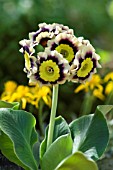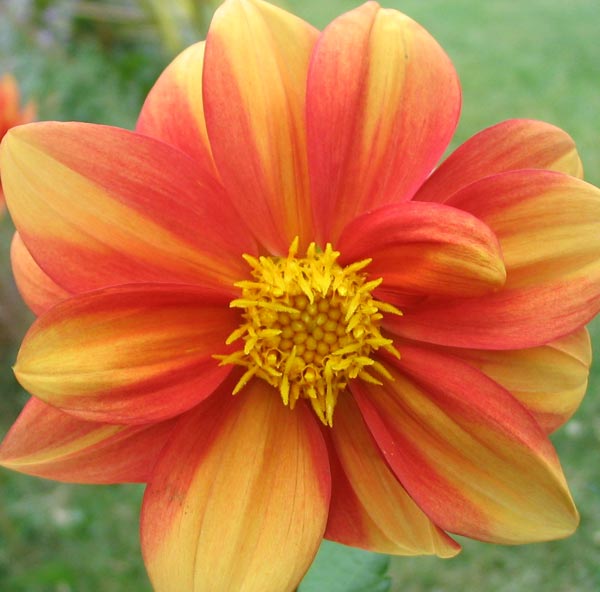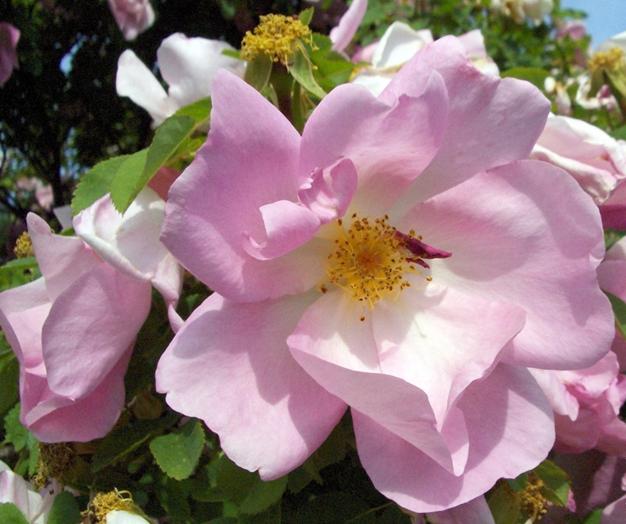 It's taken me weeks to finish Kushiel's Avatar by Jacqueline Carey
It's taken me weeks to finish Kushiel's Avatar by Jacqueline Carey First of all, if you haven't read the first two books in this series I strongly suggest giving them a shot. Myself, I mainly read romance and urban fantasy and almost never touch traditional fantasy. Phedre is a courtesan (and also a spy) who specializes in being submissive. She uses this role to move through wars and politics and all manner of intrigue. As a romance reader I am always innately cautious about approaching a book with this type of heroine and plot because I don't care for page after page of mindless pornographic sex without genuine emotion. And I sincerely doubted that a courtesan could find true abiding love with one person while still practicing her craft. But in fact, Carey has a talent for keeping everything tasteful without making it bland. And sexual intrigues aside, Phedre is a strong likeable character who develops and evolves into what I now consider one of my all time favorite heroines.
First of all, if you haven't read the first two books in this series I strongly suggest giving them a shot. Myself, I mainly read romance and urban fantasy and almost never touch traditional fantasy. Phedre is a courtesan (and also a spy) who specializes in being submissive. She uses this role to move through wars and politics and all manner of intrigue. As a romance reader I am always innately cautious about approaching a book with this type of heroine and plot because I don't care for page after page of mindless pornographic sex without genuine emotion. And I sincerely doubted that a courtesan could find true abiding love with one person while still practicing her craft. But in fact, Carey has a talent for keeping everything tasteful without making it bland. And sexual intrigues aside, Phedre is a strong likeable character who develops and evolves into what I now consider one of my all time favorite heroines.
Furthermore, the world building in these books is completely unique compared to anything I've read before. It's set in a kind of alternate historical Europe. Any magic or fantasy elements employed are based on mythology including (but not limited to) Christianity, Greek, Eqyptian, Norse, and Celtic. These elements are never used too outrageously, but instead come up only when they fit the story.
 In this particular book she has two major goals--to find and free Imriel de la Courcel after he has been kidnapped, and to free Hyacinth from his role as Master of the Straights. The key to this, incidentally, is to find and speak the name of God. These goals gave the plot a nice solid structure, so that this book seemed to have more order to it than the other two. The plot goes to some dark and strange places. There are many adventure elements and a lot more use of the mythology and religion that was touched on in previous books. In the midst of all of this there are some unexpected touches of horror, which as a fan of such things I enjoyed.
In this particular book she has two major goals--to find and free Imriel de la Courcel after he has been kidnapped, and to free Hyacinth from his role as Master of the Straights. The key to this, incidentally, is to find and speak the name of God. These goals gave the plot a nice solid structure, so that this book seemed to have more order to it than the other two. The plot goes to some dark and strange places. There are many adventure elements and a lot more use of the mythology and religion that was touched on in previous books. In the midst of all of this there are some unexpected touches of horror, which as a fan of such things I enjoyed. Phedre has done a great deal of maturing leading up to this book, and it's apparent in the narrative. She shows less willful recklessness and self focus, and more thoughtful planning. Furthermore, the focus is much less on her skills as a courtesan and more on her ability to endure hardships of all kinds. I was happy to see that, because while I enjoyed her role in the earlier books it was easy to see that this book was setting her up as a mentor figure. In other words, it was necessary to transform her into a character that could be viewed as a respectable teacher.
Phedre has done a great deal of maturing leading up to this book, and it's apparent in the narrative. She shows less willful recklessness and self focus, and more thoughtful planning. Furthermore, the focus is much less on her skills as a courtesan and more on her ability to endure hardships of all kinds. I was happy to see that, because while I enjoyed her role in the earlier books it was easy to see that this book was setting her up as a mentor figure. In other words, it was necessary to transform her into a character that could be viewed as a respectable teacher. Joscelin's entire character arc for the trilogy has been learning to cope with loving Phedre, despite their opposing personalities and the nature of her work. Most of this was dealt with in the second book. In this one, he proves his level of devotion yet again. It's wonderfully romantic, of course, but doesn't leave much for me to say in terms of character development that I haven't already said. He has matured, displays less of a temper, and is obviously being molded into a father figure.
Joscelin's entire character arc for the trilogy has been learning to cope with loving Phedre, despite their opposing personalities and the nature of her work. Most of this was dealt with in the second book. In this one, he proves his level of devotion yet again. It's wonderfully romantic, of course, but doesn't leave much for me to say in terms of character development that I haven't already said. He has matured, displays less of a temper, and is obviously being molded into a father figure.Now, for the secondary characters (there are too many to really mention them all) I felt fairly satisfied. Everyone had a role to play and appeared when it was time for them to play it. Hyacinth was one of my favorite characters from the first book, and I wish this one had more of him. But when he does appear, he's fascinating. As for Imriel, I found him to be a sympathetic character, but a little underdeveloped. Carey gives him a few character traits to make him memorable, but for the most part he exists to drive the plot forward. I can't complain to much about this, since I know he has his own trilogy. And Melisande, that villainous character I loved to hate, is in this book a lot less and is somewhat less villain-like. There are one or two villainous characters, but the plot is much more driven by quest based conflict than political intrigue.
I feel fairly confident in saying that this was my favorite book in the Phedre trilogy. I enjoyed having a more mature heroine. I liked most of the plot elements, especially the darker ones. The plot felt well paced. Most importantly, it drew Phedre's story to a conclusion that I found satisfying. It isn't precisely a happily ever after, but she does find peace and happiness. I really appreciate Carey's intricate writing style and all the detail that goes into these books. Again, I highly recommend trying they. I don't have any complaints worth mentioning for this one. 5 stars.

No comments:
Post a Comment
Thoughtful comments are appreciated! I always respond to them, and I usually return the favor! Happy reading!